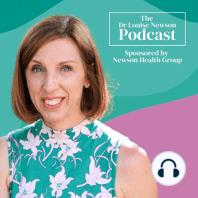31 min listen

182 - Mental illness and the role of estradiol with psychiatrist Professor Jayashri Kulkarni
182 - Mental illness and the role of estradiol with psychiatrist Professor Jayashri Kulkarni
ratings:
Length:
34 minutes
Released:
Dec 13, 2022
Format:
Podcast episode
Description
This episode contains reference to suicide
Professor Jayashri Kulkarni is a psychiatrist working in Melbourne, Australia, specialising in women’s mental health and researching the role of estradiol in mental illnesses such as schizophrenia and depression. She founded and directs the Monash Alfred Psychiatry Research Centre, a large clinical research group in Melbourne. In 2022, Professor Kulkarni launched and directs HER Centre Australia – a Monash University Centre delivering Health, Education and Research in women’s mental health - dedicated to improving the quality of care for women with mental illnesses by developing specific treatments tailored to suit women’s needs.
In this episode, the experts discuss the different ways estradiol influences brain health and function, what this means for healthy brain aging and longevity, and they share some of their experiences when helping women with mental health changes during the perimenopause and menopause.
Prof. Kulkarni’s tips for women experiencing mental health changes:
Trust your instinct – you know you best. If you think it might be hormones, help is available.
Look at your background history. If you had premenstrual mood changes or postnatal depression in the past, this may mean you are particularly sensitive to hormonal changes.
Early life trauma (e.g. neglect or emotional/physical/sexual abuse) can disrupt hormone signals and brain chemistry and this may make you more vulnerable to mental illness.
Whatever your past history, there is help available in the form of HRT. See your local healthcare provider or a menopause specialist if needed.
You can find the Meno-D questionnaire here. This tool identifies the specific mood changes that are more typically present in perimenopause and menopause related depression.
For more information on Professor Kulkarni’s work and research, visit www.maprc.org.au
Professor Jayashri Kulkarni is a psychiatrist working in Melbourne, Australia, specialising in women’s mental health and researching the role of estradiol in mental illnesses such as schizophrenia and depression. She founded and directs the Monash Alfred Psychiatry Research Centre, a large clinical research group in Melbourne. In 2022, Professor Kulkarni launched and directs HER Centre Australia – a Monash University Centre delivering Health, Education and Research in women’s mental health - dedicated to improving the quality of care for women with mental illnesses by developing specific treatments tailored to suit women’s needs.
In this episode, the experts discuss the different ways estradiol influences brain health and function, what this means for healthy brain aging and longevity, and they share some of their experiences when helping women with mental health changes during the perimenopause and menopause.
Prof. Kulkarni’s tips for women experiencing mental health changes:
Trust your instinct – you know you best. If you think it might be hormones, help is available.
Look at your background history. If you had premenstrual mood changes or postnatal depression in the past, this may mean you are particularly sensitive to hormonal changes.
Early life trauma (e.g. neglect or emotional/physical/sexual abuse) can disrupt hormone signals and brain chemistry and this may make you more vulnerable to mental illness.
Whatever your past history, there is help available in the form of HRT. See your local healthcare provider or a menopause specialist if needed.
You can find the Meno-D questionnaire here. This tool identifies the specific mood changes that are more typically present in perimenopause and menopause related depression.
For more information on Professor Kulkarni’s work and research, visit www.maprc.org.au
Released:
Dec 13, 2022
Format:
Podcast episode
Titles in the series (100)
008 - Migraines & Menopause - GP & Menopause Expert Dr Sarah Ball & Dr Louise Newson: Migraines and worsening headaches can be a very common symptom of the perimenopause and menopause. In this podcast, Dr Louise Newson speaks with Dr Sarah Ball who explains why this can occur and ways of managing migraines for women who have changing horm... by The Dr Louise Newson Podcast